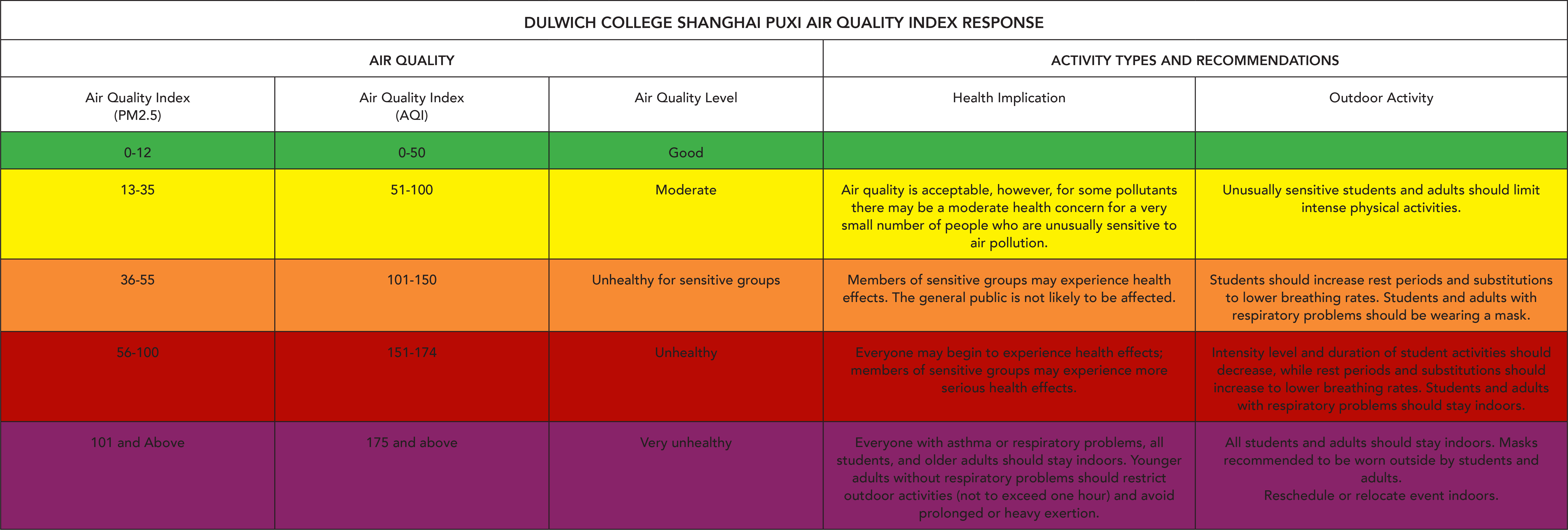Air Quality Management
WHAT IS AQI:
Air Quality Index is made up of several components, ground-level ozone, particle pollution (both PM 2.5 and PM10), carbon monoxide, sulphur dioxide, and nitrogen dioxide. Particles less than 10 micrometers in diameter (PM10) pose a health concern because they can be inhaled into and accumulate in the respiratory system. Particles less than 2.5 micrometers in diameter (PM2.5) are referred to as “fine” particles and are believed to pose the greatest health risks. Because of their small size (approximately 1/30th the average width of a human hair), fine particles can lodge deeply into the lungs. (www.airnow.gov/aqi/aqi-basics)
OUR STUDENTS’ SAFETY COMES FIRST:
Our policy is based on keeping students and other members of our community as safe as possible, and therefore focuses on the level of PM2.5. Our policy is in line with many other international schools in Shanghai. When making a decision about what is appropriate action due to that day’s air quality, both the AQI and the PM2.5 will be taken into consideration, the higher reading according to the table below being used to determine the action to be taken. For example, if the AQI reading is 115, but the PM2.5 is 78, then the action will be from the red category.

HOW DO WE MONITOR AQI ON CAMPUS: LIVE REPORTING
In order to ensure our data readings are live and accurate at all times, Dulwich has invested in a highly sophisticated and professional IT system called QLEAR which has air monitors throughout the campus. Readings are downloaded from these monitors and updated into the QLEAR system every 30 minutes. This system then produces a PM2.5 reading. The current PM2.5 reading is then input into a AQI calculator to give a AQI level for the whole campus. The readings are taken every 30 minutes and reported to all staff for their attention and action four times per day at 8.00am, 9.30am, 12.30pm and 2.30pm.
The air quality band will be displayed on all main exit doors in the College.
KEEPING OUR INDOOR AIR QUALITY SAFE FOR STUDENTS:
When air quality outdoors is poor, we ensure all teachers and non-academic staff keep windows and doors shut as much as possible. We use air curtains in Early Years learning spaces which circulate clean air into classrooms. We also use air locks at all main entry and exit points to minimise the chance of poor air quality indoors.
CO-CURRICULAR ACTIVITIES:
On high pollution days, CCAs will not be cancelled but alternative activities will be put in place and students will complete the CCA timeslot doing alternative, safe air activities.
EDUCATIONAL VISITS:
A reading will be taken prior to any school educational visit. If the reading is into the Red band, the member of staff responsible for the visit will postpone the trip. The member of staff responsible will make the necessary arrangements and communicate directly with parents of the students on the visit. In the case of residential visits the member of staff responsible for the visit will use the AQI reading APP available at the location of the trip to take Air Quality readings at the start of and during the day to decide if outdoor activities need to be modified or postponed.
COMPETITIVE SPORTS:
For competitive sports fixtures we follow the guidelines laid down by the host school who is overseeing the competition.
SCHOOL CLOSURE:
The College will not close due to poor air quality unless it is instructed to do so by the Shanghai Municipal Educational Commission.
If a parent chooses to keep a student at home for health reasons due to poor air quality, that absence will be treated like any other health-related absence.
CHILDREN WITH SPECIFIC HEALTH RELATED ISSUES:
Parents should inform the Admissions team, the School Nurse and their child’s class teacher if their child has particular respiratory problems. Individual arrangements can be made in these instances.




